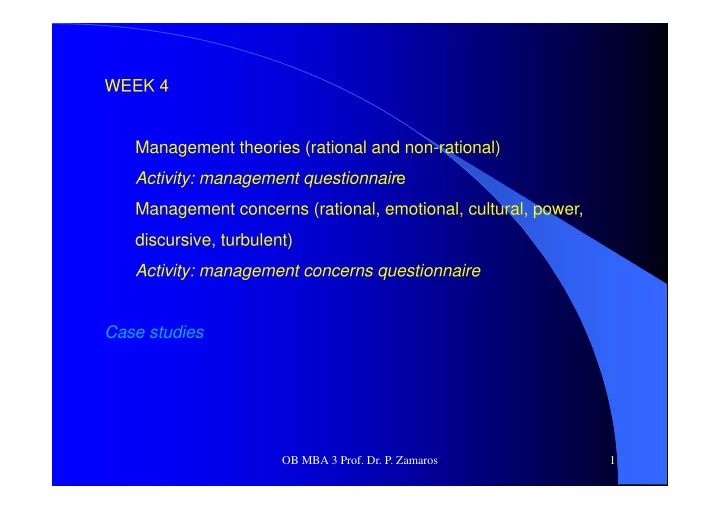

WEEK 4 Management theories (rational and non-rational) Activity: management questionnair e Management concerns (rational, emotional, cultural, power, discursive, turbulent) Activity: management concerns questionnaire Case studies OB MBA 3 Prof. Dr. P. Zamaros 1
MANAGEMENT THEORIES (RATIONAL AND NON-RATIONAL) Rational perspective Feature: With Taylor and Fayol, management is seen to be a rational activity concerned with finding the most effective and efficient ways possible of deploying resources in order to achieve the purposes of the organization. Assumption: The rational perspective considers humans as essentially lazy – McGregor’s theory X OB MBA 3 Prof. Dr. P. Zamaros 2
MANAGEMENT THEORIES (RATIONAL AND NON-RATIONAL) Non-rational perspective Feature: With Mintzberg management is non-rational in the sense that organizations like amoebas need to constantly change and adapt to their environment and thus there are many possibilities to achieve organizational goals. Assumption: The non-rational perspective considers humans as essentially creative – McGregor’s theory Y OB MBA 3 Prof. Dr. P. Zamaros 3
MANAGEMENT THEORIES (RATIONAL AND NON-RATIONAL) Management styles In practice: The above management approaches can be translated in the following styles: Autocratic Participative (democratic) Development: The following styles can be added: Consultative Custodial (paternalistic) Supportive Laissez-faire OB MBA 3 Prof. Dr. P. Zamaros 4
ACTIVITY: MANAGEMENT QUESTIONNAIR E Purpose: To identify the management style you prefer to operate in OB MBA 3 Prof. Dr. P. Zamaros 5
MANAGEMENT CONCERNS (RATIONAL, EMOTIONAL, CULTURAL, POWER, DISCURSIVE, TURBULENT) Assumption: Thus far the concept “management” has gone unexamined. Understanding management: It is necessary to summarise arguments made about management into key concerns: establish the unifying themes underpinning these arguments. Process: This requires experiencing the various descriptions about what management is about OB MBA 3 Prof. Dr. P. Zamaros 6
MANAGEMENT CONCERNS (RATIONAL, EMOTIONAL, CULTURAL, POWER, DISCURSIVE, TURBULENT) Difficulty: Theoretical fragmentation . Solution: Integrative perspective Plural perspective Perspective taken here: Integrative. Result: There is a common thread that underlies descriptions: they refer to management as action . OB MBA 3 Prof. Dr. P. Zamaros 7
MANAGEMENT CONCERNS (RATIONAL, EMOTIONAL, CULTURAL, POWER, DISCURSIVE, TURBULENT) From action to act: management as “action” ( actio ) presents itself as a series of existing and present experiences. management as “act” ( actum ) consists in the terminated, completed acts of management as action Moreover: management as action is a ‘movement into the future’ management as act is ‘ the reason for the movement into the future’ OB MBA 3 Prof. Dr. P. Zamaros 8
MANAGEMENT CONCERNS (RATIONAL, EMOTIONAL, CULTURAL, POWER, DISCURSIVE, TURBULENT) Consequence: Descriptions of management action and acts are ‘n-step guides’ in that these mythologies play both a descriptive and prescriptive role Note: Since action and act are causally related, action is meaningful and its meaning stems from a particular concern during that action – the issue then is to discover such concerns (i.e. descriptive contents). OB MBA 3 Prof. Dr. P. Zamaros 9
MANAGEMENT CONCERNS (RATIONAL, EMOTIONAL, CULTURAL, POWER, DISCURSIVE, TURBULENT) Management concerns: Rational : a concern for processes, figures and tasks Emotional : a concern for people perceptions Cultural : a concern for unity Power : a concern for politics Discursive : a concern for describing and imaging Turbulent : a concern with the business environment OB MBA 3 Prof. Dr. P. Zamaros 10
ACTIVITY: MANAGEMENT QUESTIONNAIR E Purpose: To identify your management concerns OB MBA 3 Prof. Dr. P. Zamaros 11
ACTIVITY: CASE STUDIES Purpose: Analyze cases and behaviors of leaders with the help of theories and models encountered in class OB MBA 3 Prof. Dr. P. Zamaros 12
Recommend
More recommend